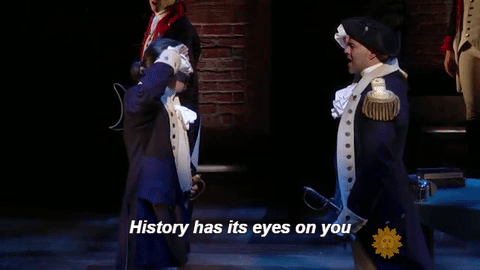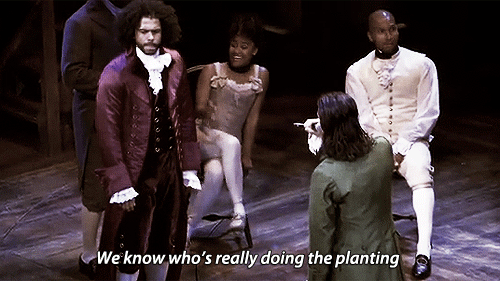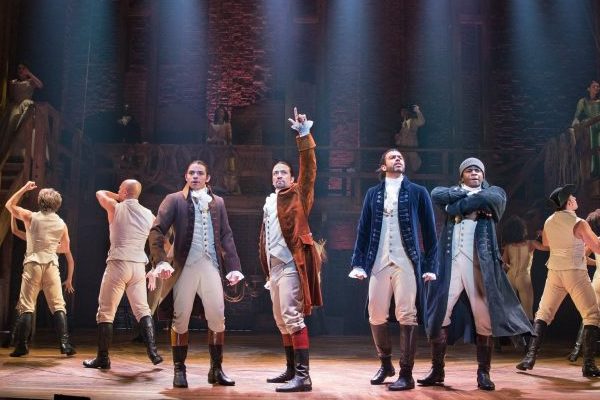Writer/composer/performer Lin-Manuel Miranda has described Hamilton: An American Musical as “a story about America then, told by America now.” Mind you, he said this back in 2015, when the show debuted to unprecedented acclaim and we all hated each other just a little bit less. However, even back then, this retelling of Alexander Hamilton’s journey from immigrant to founding father was hotly debated for its controversial entanglement of the contemporary and archaic (particularly in regards to diversity).
According to a modern and overtly pragmatic lens, the founding fathers were bigoted assholes. They owned slaves while simultaneously preaching about freedom (among other things). This is why, as the Broadway production enjoys a rebirth on Disney+, #CancelHamilton has found its way online. In a year forcing us to dissect the missteps of our past, our history warrants deconstruction. You can look at Hamilton one of two ways: a glorification of assholery or a self-aware and optimistic re-construction that gives ownership to those who have been historically excluded. By design, It doesn’t do this explicitly. It wants us to talk about it; to use it as a catalyst to implement new ideas. With that in mind, let’s look at how Hamilton tells its story as progressively as it possibly can.
Cover Photo: Disney+
Whatcha gonna do? Keep scrolling: ‘Cops’ Canceled After 31-Year Run, But Who Needs It When We Have Social Media
Nothing is sacred: Jesus Christ! Savior Reportedly Cancels Second Coming, Says He’ll Try Again When Everyone Can Hold Hands During Songs Again
Visit the Mandatory Shop for great deals on your very own Mandatory merch.
Follow Mandatory on Facebook, Twitter, and Instagram.
hamilton
-
The Music

One of the most charming, obvious, and important aspects of Hamilton is its music. Its implementation of rap and hip-hop is technically marvelous in how it serves its narrative. Characters like Hamilton, John Laurens, and Phillip Hamilton (who died relatively young) rap faster than others, as if to say, “Here is the information, I don’t have much time.” Other characters like Eliza Schuyler (who outlives almost everyone) are allowed to take their time—they don’t just rap. Hamilton’s music reflects not only the characters’ legacies but our own; using a genre created entirely by people of color, their influence permeates a typically white-washed story. This makes it more accessible (to Broadway snobs and otherwise) and, quite frankly, more fun.
-
Founding Fathers vs. Founding Fathers of Hip-Hop

Hamilton alludes to more than just the rise of immigrant/wordsmith, Alexander Hamilton. Capitalizing on that “wordsmith” part, Lin-Manuel Miranda draws (lyrical) parallels between Hamilton’s rise through words and heavy-hitters like Jay Z, Biggie, Nas, Mobb Deep, Snoop Dogg, DMX, and many more. This can be seen right off the bat with the show’s opening number, “Alexander Hamilton,” when there’s a call-and-response “What’s your name?” moment reminiscent of some of hip-hop/rap’s greatest entries. Slate's Forrest Wickman wrote up a fantastic guide to all the musical allusions/references in Hamilton.
-
The Performers

At the heart of Hamilton is a celebration of BIPOC in America and this is seen in its casting. To drive this point home, Hamilton’s central characters (and most of its cast) are played by BIPOC. By having done this, the show inexplicably rewrites history, giving a voice to those who have been historically side-lined. Even though the events depicted were carried out in history by white people, in contemporary society, they can (or should) just as easily be carried out by immigrants/BIPOC—which is Alexander’s Hamilton story/legacy, to begin with (the immigrant part at least). It should be noted that while Hamilton celebrates immigration, we’re meant to consider the fact that not everyone in America came here by it—which is conveyed by the voices telling you the story—dismantling the pervasive image of old white men.
-
The Events

Hamilton makes the Revolutionary War and the birth of America entertaining again; from cabinet meetings to its humorous monologues. The Shakespearean fool of this play is King George III. Played by the only white guy in the production, King George III is nothing if not an oppressor. This portrayal is both historically accurate and symbolical. That in itself says a lot. It (should) go without saying that the story of the Revolutionary War is an important one; the colonies opposing control British control, choosing progress and independence over political enslavement. Alexander Hamilton, as an immigrant who played a huge part in the constitutional and financial construction of the U.S., Hamilton is perhaps the only founding father through which Hamilton’s message can be conveyed...and the production takes admitted liberties with even his portrayal.
-
Historical Inaccuracy

Alexander Hamilton wasn’t as contemporary or progressive in his values as the musical leads you to believe. While he was a founding member of the New York Manumission Society which pushed for the emancipation of New York State, he did very little to oppose slavery while he was alive (he was often more in favor of property rights). In Eliza Hamilton’s final number, “Who Lives, Who Dies, Who Tells Your Story,” she says that her husband “could’ve done so much more if only [he] had time,” implying he would’ve (maybe) done something about racial injustice.
There’s no denying the fact that Alexander Hamilton is portrayed as a really “good” character in Hamilton; however, he is more of a stand-in for the audience than a historically accurate depiction of a founding father. It's close. This balancing fact and fiction for the sake of contemporary resonance is the tight-rope act that has resulted in passionate debate. Regardless, Hamilton is not meant to be seen as historical realism. Its "Alexander Hamilton" captures the dramatic essence of the man and is meant to reflect what immigrants are (or at least should be) capable of accomplishing in America. It rewrites history while still adhering to it (in a good way).
-
Thomas Jefferson Was A Hypocrite

In real life, Alexander Hamilton never criticized Thomas Jefferson’s hypocritical view of African-Americans. However, Lin-Manuel Miranda’s Hamilton does. By calling him (and others) out, Hamilton shows how the revolutionaries’ fight for freedom excluded African-Americans. Some critics have said that the production doesn’t address this enough, but an argument can be made that Hamilton is too self-aware to do so. If Alexander Hamilton was depicted as overtly opposed to slavery, it would be almost too unrealistic. Hamilton knows the founding fathers were "assholes." In its diversely framed retelling of events, it gives the audience just enough to highlight history's hypocrisy. The rest is up to us.
-
The Role of Women

While women are not central to Hamilton, they have their moments and play an important role. The play addresses the inequality present in this period; when Angelica Schuyler samples the “all men are created equal” part of the Declaration of Independence she implores Thomas Jefferson to “include women in the sequel.” Also, Eliza Hamilton’s role in the play is limited at first (which she addresses in her “let me be apart of this narrative” number listing her accomplishments and relevancy). Hamilton ends with Eliza as she vows to keep "Alexander Hamilton's" legacy alive by telling this story. This could be seen as sexist (importance by romantic association), and maybe that's the point. It once again highlights how excluded women were from history's narrative. Within the confines of its narrative, Hamilton certainly tries its best to be feminist without risking dissonance.
-
The Message

There's a reason freedom of speech is the First Amendment in the Constitution: discourse is patriotism. The racial duality of fact and fiction in Disney+’s Hamilton is frustrating but also important. The musical is optimistic/humorous for a reason—to remind us how far we have come. Yes, European immigrants founded America, but the people who live here now, of all races and creeds, are the ones who will keep it alive.
Cancel culture is obsessed with the idea that our pasts define us. It many cases they do. Some monstrosities cannot be overlooked. But we can’t "cancel" Alexander Hamilton, Thomas Jefferson, Aaron Burr, or George Washington. They’re dead and gone; they won’t feel the societal impact/punishment of being discarded and we can’t lessen the weight of their decisions. What we can do is contextualize their legacies, learn from their mistakes, and relish what America means while simultaneously acknowledging its inconsistencies. We certainly have no ill will towards Hamilton's creators or performers. That’s who we’d be canceling. At the same time, they don't want us to shy away from these discussions. In response to recent outrage surrounding Hamilton, Lin-Manuel Miranda tweeted, “All criticisms are valid.” Because that’s the point. Hamilton itself is a discussion between past and present. The arguments are what makes it great—progress through discourse (you’re supposed to be conflicted about it).









